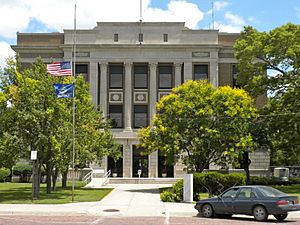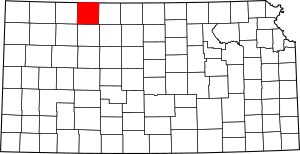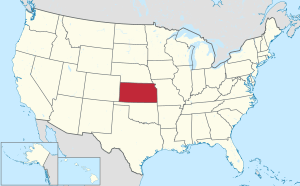Norton County, Kansas facts for kids
Quick facts for kids
Norton County
|
|
|---|---|

Norton County Courthouse in Norton (built 1929)
|
|

Location within the U.S. state of Kansas
|
|
 Kansas's location within the U.S. |
|
| Country | |
| State | |
| Founded | February 26, 1867 |
| Named for | Orloff Norton |
| Seat | Norton |
| Largest city | Norton |
| Area | |
| • Total | 881 sq mi (2,280 km2) |
| • Land | 878 sq mi (2,270 km2) |
| • Water | 3.2 sq mi (8 km2) 0.4%% |
| Population
(2020)
|
|
| • Total | 5,459 |
| • Density | 6.2/sq mi (2.4/km2) |
| Time zone | UTC−6 (Central) |
| • Summer (DST) | UTC−5 (CDT) |
| Area code | 785 |
| Congressional district | 1st |
Norton County is a county located in the state of Kansas in the United States. It's a place where people live, work, and go to school. The main city and the place where the county government is located is called Norton. In 2020, about 5,459 people lived here.
The county was officially started in 1867. It was named after Orloff Norton. He was a captain in the 15th Kansas Militia Infantry Regiment during the American Civil War.
Contents
History
How Norton County Began
For thousands of years, the Great Plains region of North America was home to Native Americans. They often moved around, following animal herds.
Later, in the 16th to 18th centuries, France claimed a large part of North America. In 1762, after a war, France secretly gave this land to Spain.
Important Events in the 1800s
In 1802, Spain gave most of the land back to France. Then, in 1803, the United States bought a huge area of land from France. This was called the Louisiana Purchase. Most of what is now Kansas was part of this big purchase.
In 1854, the area became the Kansas Territory. Kansas officially became the 34th U.S. state in 1861.
Norton County itself was founded by a group of people on August 22, 1872. The city of Norton became the county seat in 1878. The county is named after Orloff Norton, a soldier who died in 1864 during the Civil War.
The first unofficial county fair happened in Leota in October 1878. After 1900, the fair was held every year in Elmwood Park in Norton. The first school district in Norton was created in 1872. School classes began in a dugout home on December 1, 1873.
Recent Times (2000s)
In 2020, Norton County faced a big challenge during the COVID-19 pandemic. A state prison in Norton, the Norton Correctional Facility, had many cases of the virus. Also, a nursing home in Norton, the Andbe Home, had many residents get sick. Local officials worked to manage the situation and keep people safe.
Where is Norton County?
Norton County covers about 881 square miles. Most of this area is land, with a small amount of water.
Neighboring Counties
Norton County shares its borders with these other counties:
- Furnas County, Nebraska (to the north)
- Harlan County, Nebraska (to the northeast)
- Phillips County (to the east)
- Graham County (to the south)
- Sheridan County (to the southwest)
- Decatur County (to the west)
Who Lives in Norton County?
| Historical population | |||
|---|---|---|---|
| Census | Pop. | %± | |
| 1880 | 6,998 | — | |
| 1890 | 10,617 | 51.7% | |
| 1900 | 11,325 | 6.7% | |
| 1910 | 11,614 | 2.6% | |
| 1920 | 11,423 | −1.6% | |
| 1930 | 11,701 | 2.4% | |
| 1940 | 9,831 | −16.0% | |
| 1950 | 8,808 | −10.4% | |
| 1960 | 8,035 | −8.8% | |
| 1970 | 7,279 | −9.4% | |
| 1980 | 6,689 | −8.1% | |
| 1990 | 5,947 | −11.1% | |
| 2000 | 5,953 | 0.1% | |
| 2010 | 5,671 | −4.7% | |
| 2020 | 5,459 | −3.7% | |
| 2023 (est.) | 5,330 | −6.0% | |
| U.S. Decennial Census 1790–1960 1900–1990 1990–2000 2010–2020 |
|||
In 2000, there were about 5,953 people living in Norton County. These people lived in about 2,266 homes. The population density was about 7 people per square mile.
The people living in Norton County come from different backgrounds. Most residents are White. There are also people who identify as Black or African American, Native American, Asian, and other races. Some residents are also of Hispanic or Latino background.
The population is made up of different age groups. About 22% of the people are under 18 years old. The median age in the county was 40 years old. This means half the people were younger than 40 and half were older.
Schools in Norton County
Norton County has several school districts that serve its communities. These districts help make sure students get a good education.
Unified school districts
Here are some of the school districts in Norton County:
- Logan USD 326
- Norton USD 211
- Northern Valley USD 212
- Oberlin USD 294
Towns and Communities
Norton County has several cities and smaller communities where people live. Some places are still active, while others are now "ghost towns."
Cities
These are the main cities in Norton County:
- Almena
- Clayton‡ (part of this city is in another county)
- Edmond
- Lenora
- Norton (This is the county seat, where the main government offices are.)
Small Communities
These are smaller communities that are not officially cities:
Places That Used to Be There (Ghost Towns)
These are places that once had people living in them but are now abandoned:
- Bower
- Brett
- Cactus
- Devizes
- Fairhaven
- Hanback
- Hedgewood
- Rayville
- Rockwell
- Smithton
- Wakeman
See also
 In Spanish: Condado de Norton para niños
In Spanish: Condado de Norton para niños



